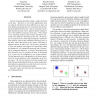Free Online Productivity Tools
i2Speak
i2Symbol
i2OCR
iTex2Img
iWeb2Print
iWeb2Shot
i2Type
iPdf2Split
iPdf2Merge
i2Bopomofo
i2Arabic
i2Style
i2Image
i2PDF
iLatex2Rtf
Sci2ools
ICDM
2007
IEEE
2007
IEEE
Non-redundant Multi-view Clustering via Orthogonalization
Typical clustering algorithms output a single clustering of the data. However, in real world applications, data can often be interpreted in many different ways; data can have different groupings that are reasonable and interesting from different perspectives. This is especially true for high-dimensional data, where different feature subspaces may reveal different structures of the data. Why commit to one clustering solution while all these alternative clustering views might be interesting to the user. In this paper, we propose a new clustering paradigm for explorative data analysis: find all non-redundant clustering views of the data, where data points of one cluster can belong to different clusters in other views. We present a framework to solve this problem and suggest two approaches within this framework: (1) orthogonal clustering, and (2) clustering in orthogonal subspaces. In essence, both approaches find alternative ways to partition the data by projecting it to a space that i...
Alternative Clustering Views | Clustering Views | Data Mining | ICDM 2007 | Typical Clustering Algorithms |
| Added | 03 Jun 2010 |
| Updated | 03 Jun 2010 |
| Type | Conference |
| Year | 2007 |
| Where | ICDM |
| Authors | Ying Cui, Xiaoli Z. Fern, Jennifer G. Dy |
Comments (0)

